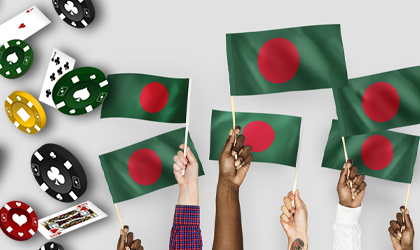Casino Problem In Bangladesh
GENEVA/DHAKA/NEW YORK, 5 April 2019 – Devastating floods, cyclones and other environmental disasters linked to climate change are threatening the lives and futures of more than 19 million children in Bangladesh, UNICEF said today.
The Rise and Fall of Casinos in Bangladesh. Published September 30th, 2019 - 08:53 GMT (AFP File) Highlights. Bangladesh is now cracking down on casinos run by ruling party figures.
In a new report, UNICEF says that while Bangladeshis have developed admirable powers of resilience, more resources and innovative programmes are urgently needed to avert the danger that climate change represents to the country’s youngest citizens.
Players in Bangladesh can only access foreign casino sites that accept players from that region. Note that players also have to be at least 18 years of age to participate. And as a given, players will not have to pay taxes on their winnings when playing on foreign sites, as that is. 🇧🇩 Discover the top rated online casinos in Bangladesh accepting Bangladeshi Taka for Bangladeshi players. Top 3 casinos: casino1, casino2, casino3. According to a news at 'mobilecasinorank' citizen of Bangladesh can enter casino through their smart phone. The Casino may be expressly ban by amending The Public Gambling Act- 1867 and other gambling but allow Casino for foreign visitors. Online casinos accepting players from Bangladesh. The People's Republic of Bangladesh is one of the most densely populated countries in the world. It operates under a parliamentary system of government. Most gambling is considered illegal aside from sanctioned lotteries (prize.
“Climate change is deepening the environmental threat faced by families in Bangladesh’s poorest communities, leaving them unable to keep their children properly housed, fed, healthy and educated,” said UNICEF Executive Director Henrietta Fore, who visited Bangladesh in early March 2019. “In Bangladesh and around the world, climate change has the potential to reverse many of the gains that countries have achieved in child survival and development.”
The report, A Gathering Storm: Climate change clouds the future of children in Bangladesh, points out that Bangladesh’s flat topography, dense population and weak infrastructure make it uniquely vulnerable to the powerful and unpredictable forces that climate change is compounding. The threat is felt from the flood and drought-prone lowlands in the country’s north to its storm-ravaged coastline along the Bay of Bengal.
Drawing on interviews with families, community leaders and officials, UNICEF says that a combination of extreme weather events – such as flooding, storm surges, cyclones and droughts – and longer-term phenomena directly related to climate change – such as sea level rise and salt water intrusion – are forcing families deeper into poverty and displacement. In the process, children’s access to education and health services is severely disrupted.
Around 12 million of the children most affected live in and around the powerful river systems which flow through Bangladesh and regularly burst their banks. The most recent major flooding of the Brahmaputra River in 2017 inundated at least 480 community health clinics and damaged some 50,000 tube wells, essential for meeting communities’ safe water needs.

Another 4.5 million children live in coastal areas regularly struck by powerful cyclones, including almost half a million Rohingya refugee children living in fragile bamboo and plastic shelters.
A further 3 million children live further inland, where farming communities suffer increasing periods of drought.
The report says that climate change is a key factor pushing poorer Bangladeshis to abandon their homes and communities and to try and rebuild lives elsewhere. Many head to Dhaka and other major cities, where children risk being pushed into dangerous forms of labour and into early marriages. It cites research showing that Bangladesh has 6 million climate migrants already, a number that could more than double by 2050.
“When families migrate from their homes in the countryside because of climate change, children effectively lose their childhoods,” says UNICEF Bangladesh Representative Edouard Beigbeder. “They face danger and deprivation in the cities, as well as pressure to go out to work despite the risk of exploitation and abuse.”

UNICEF points out that since the early 1990s, investment and action – both in disaster preparedness and risk reduction programmes – have made vulnerable communities in Bangladesh more resilient to the dangers of climatic shock. For example, one result has been a dramatic reduction in the mortality rate caused by cyclones over recent decades.
Casino Problem In Bangladesh Taka


The report calls on the international community and other partners to support the government in implementing a range of initiatives to shield children from the effects of climate change. One example is a technology being promoted by UNICEF and other partners which helps coastal communities protect their vital supplies of drinking water against the intrusion of salt water from the sea. The system – known as Managed Aquifer Recharge – is working in around 75 communities and is ready to be taken to scale.
######
Notes for editors:
Health Problems In Bangladesh
Multimedia materials available here: https://weshare.unicef.org/Package/2AMZIF3DTOE5